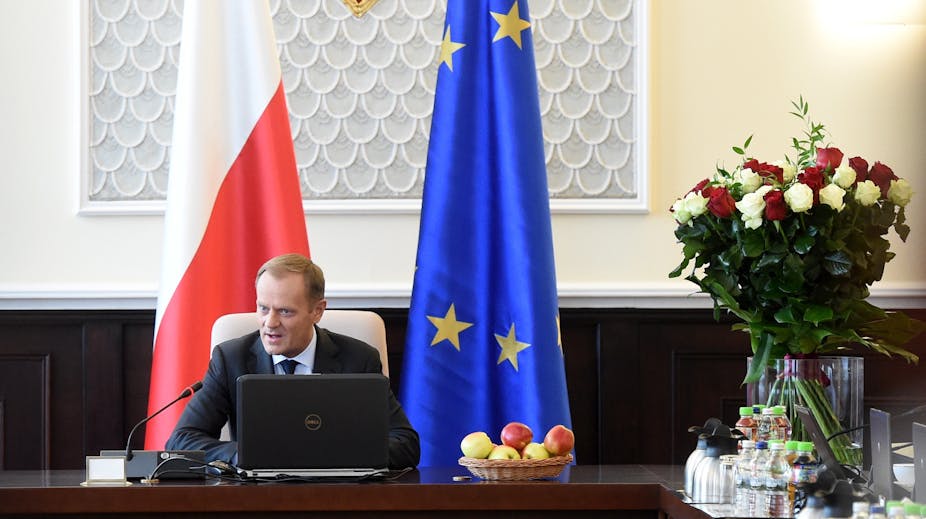The Poles and Russians have had a difficult relationship going back centuries. In recent times, the key problem has been competing geopolitical ambitions over the former Soviet republics. Poland wants to draw them as much as possible into the orbit of the West, which means trying to get the EU and NATO to enlarge eastwards to include them. The great prize is Ukraine. The view of the Poles, whose prime minister Donald Tusk is the new president of the European Council, is that as long as Ukraine is in the West’s orbit, there is no chance of a new Russian empire emerging. The subtext is that it could pose a security threat on the eastern Polish border. Former president Lech Kaczynski summarised Polish concerns when he spoke at a rally in Tblisi during the Georgia conflict in 2008.
On the other hand the Russians, particularly since the early 2000s when Vladimir Putin came to power, have wanted to try and keep the former Soviet states as close as possible. They have resisted all moves to try and draw them away.

In recent years, relations have gone through different phases. They were particularly tense between 2005 and 2007 when the previous president and government led by the right-wing Law and Justice party were particularly active in trying to draw the former Soviet republics out of Moscow’s orbit. When the current government, led by the centrist Civic Platform party, was elected in 2007 it attempted to improve relations. It modified the former policy in favour of a more subtle approach characterised by sponsoring the Eastern Partnership, which for example didn’t include a specific aspiration of future EU membership.
The Smolensk effect
Yet relations were severely knocked by the Smolensk plane crash in April 2010, in which 95 members of the Polish elite were killed. Some Poles blamed the Russians and many were critical of the Civic Platform-led government’s decision to allow its Eastern neighbour to lead the investigation. Memories of this have been stirred up in Poland by the recent MH17 crash. And in the end, of course, the Eastern Partnership started the chain of events that led to the current Ukrainian conflict. Now the Polish government and Civic Platform prime minister are being blamed by the Law and Justice opposition for being too slow to wake up to the threat of Russian imperial ambitions, while both leading parties have been claiming they are best placed to deal with Russia in the run-up to next year’s presidential and parliamentary elections.

In the mix are issues such as energy security, since Poland gets a lot of its oil and gas from Russia. This makes the Poles keen to promote European common energy security policies and ultimately military security through strengthening NATO’s presence in Poland as well. The Poles were also at the forefront of calls for European sanctions against Russia. However, its farming industry in particular will be hard-hit by the sanctions that Russia is introducing in response. One issue that Poland does not have to deal with is Russian minorities. Compared to many of its neighbours, its population is relatively ethnically homogenous.
Then there is Belarus…
A related foreign-policy issue for Poland is Belarus, its immediate neighbour to the east. Polish-Belarus relations fit with the broad pattern of Poland trying to draw the former Soviet republics towards the West and away from Moscow’s orbit. Yet Polish efforts to promote pro-Western democratic regime change in Belarus have gone on the back-burner.
This is for a number of reasons. Ukraine is the priority, given both its strategic importance and the fact that pro and anti-Western forces are fairly evenly balanced in the country. And because the Lukashenko regime in Belarus is both very well entrenched and anti-Western/democratic, it is not even included properly within the realms of the Eastern Partnership. Greater priority is given to developing links with countries like Georgia and Moldova who are more open to these kind of influences.
The issue of relations with the Polish minority in Belarus does not receive the same coverage that it did a few years back when Lukashenko shut down the independent Union of Poles in Belarus and set up a puppet pro-regime organisation in its place. Polish governments have also had problems deciding whether they should encourage a boycott of the Lukashenko regime or encourage dialogue and engagement. They have tended to zig-zag rather inconsistently between the two.
To read other editions of the Russia’s borders series, click here.

